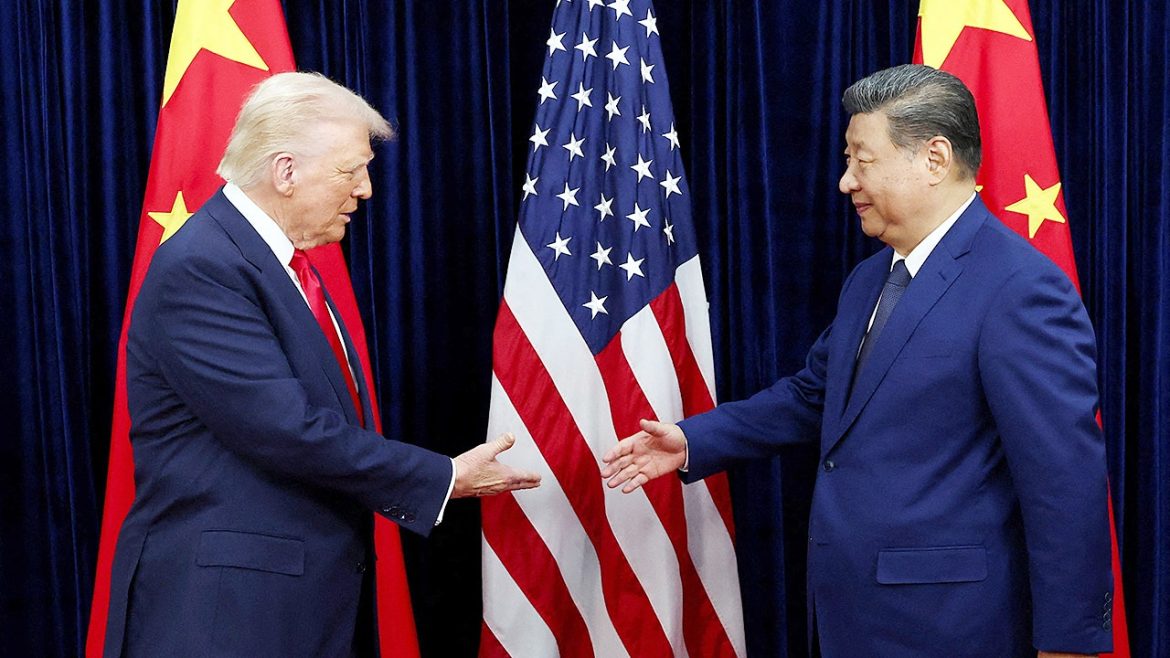When President Donald Trump met with Chinese President Xi Jinping on Thursday, the two leaders talked about trade and drug trafficking — but avoided the one issue that could most likely draw their nations into war: Taiwan.
Both sides have reasons to keep tensions low. Trump’s administration is seeking Chinese cooperation on border enforcement and drug trafficking, while Xi faces growing economic pressures at home. Yet even as diplomacy aims for calm, U.S. defense planners have long prepared for potential conflict in the Indo-Pacific.
Tensions have only deepened in recent years. Washington has approved high-profile arms sales to Taiwan, U.S. lawmakers such as then–House Speaker Nancy Pelosi have made high-profile visits, and former President Joe Biden repeatedly pledged to defend the island — only for aides to later clarify that the United States still adheres to its long-standing ‘One China’ policy.
Meanwhile, China has dramatically increased military pressure on Taiwan through large-scale drills that simulate a blockade and invasion. The People’s Liberation Army now conducts near-constant air and naval operations encircling the island — exercises that have become larger, more complex, and more frequent. What once served as symbolic shows of force now resemble rehearsals for cutting off Taiwan’s access to the outside world.
The silence from Trump and Xi contrasted sharply with the noise of those military preparations on both sides of the Pacific.
Taiwan watchers have been left guessing about just how much the United States would come to the island’s defense if China invaded — an intentional policy known as strategic ambiguity that Trump has taken to a new level.
The president earlier this month predicted optimistically that China would not invade Taiwan.
‘I think we’ll be just fine with China. China doesn’t want to do that,’ he said. ‘As it pertains to Taiwan — and that doesn’t mean it’s not the apple of his eye, because probably it is — but I don’t see anything happening.’
Compared with other conflict zones, Trump has said little about the prospect of war in the Indo-Pacific, leaving allies and adversaries alike uncertain about how far he would go to defend Taiwan.
Some analysts who favor strong U.S. support for Taiwan were relieved the issue didn’t surface, given concerns Trump might trade the island’s interests for economic concessions — such as looser Chinese mineral export restrictions, larger agricultural purchases or cooperation on curbing the precursor chemicals fueling America’s fentanyl crisis.
‘I think it’s a good thing that Taiwan didn’t come up,’ said Raymond Kuo, a senior political scientist at the RAND Corporation. ‘There’s been a lot of concern in Taiwan, especially recently, that it would be sold out for some kind of U.S.–China grand bargain.’
Matthew Kroenig, vice president of the Atlantic Council’s Scowcroft Center for Strategy and Security, said he viewed the omission as ‘neutral,’ though he would have preferred the president restate the ‘One China’ policy while warning Beijing to ‘knock off its almost daily military coercion and gray-zone activities against Taiwan.’
Kuo noted that Taiwan has sharply increased its defense spending as tensions rise, boosting its budget by roughly 75% in the past two years and now allocating a greater share of government funds to defense than the U.S. does proportionally. Still, he warned that production delays in U.S. weapons deliveries — including a backlog that exceeded $20 billion at the start of this year — could weaken Taiwan’s ability to keep pace with China’s military modernization.
Jennifer Kavanagh, director of military analysis at Defense Priorities, said she wasn’t surprised Taiwan stayed off the formal agenda. ‘There were so many trade issues that were really top of mind for both sides,’ she said. ‘Concerns about a ‘grand bargain’ over Taiwan always seemed far-fetched.’
But Kavanagh cautioned that the United States and China cannot indefinitely avoid the subject. ‘Things have escalated significantly in recent years, and the long-time understandings around the ‘One China’ policy and strategic ambiguity have started to erode,’ she said. ‘It’s important for both sides to reaffirm their commitment to peaceful means of resolving their differences.’
She added that the military balance in the region has shifted ‘rather quickly in China’s favor,’ making U.S. deterrence less credible if tensions continue to climb. ‘The time to pivot to Asia has probably passed,’ Kavanagh said, suggesting Washington must now focus on managing competition rather than reversing it.
Inside Trump’s administration, analysts say those competing instincts are visible. ‘There are really two China policies,’ Kroenig said. ‘The trade folks are looking for deals, while the defense and national-security professionals are focused on the China threat — especially the threat to Taiwan.’ That divide mirrors Washington’s broader struggle to reconcile economic engagement with military deterrence.
Kroenig added that Trump’s unpredictability may itself be part of his deterrent strategy. ‘It keeps our adversaries guessing and worried,’ he said. ‘It may be unlikely that China would attack Taiwan under his watch.’
Still, Trump’s meeting with Xi offered little clarity on where the president ultimately stands on Taiwan — or how he would respond if Beijing tested the limits of U.S. commitment to the island’s security. For now, both leaders appear content to keep the most volatile issue in their relationship unspoken. The quiet may help avert confrontation in the short term — but it leaves one of the world’s most dangerous flashpoints lingering just beneath the surface.
